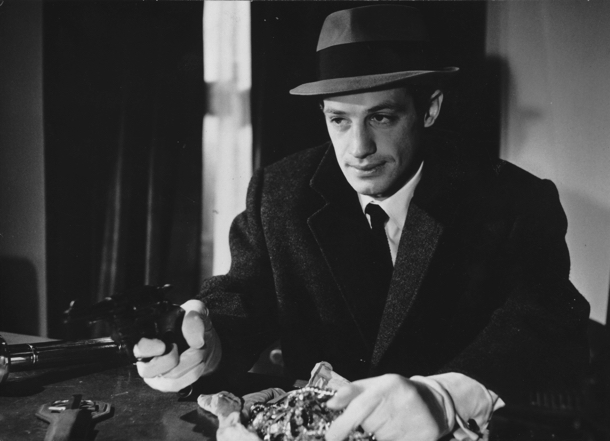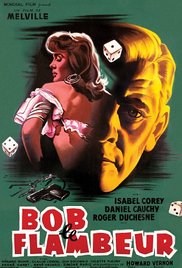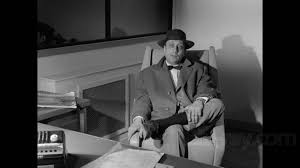
 Bluray releases to celebrate the artistically ambitious cinema of independent filmmaker Jean-Pierre Melville (1917-1973) in his centenary year.
Bluray releases to celebrate the artistically ambitious cinema of independent filmmaker Jean-Pierre Melville (1917-1973) in his centenary year.
France in the 1940s and 50s is seen as a broken nation, where male solidarity – be it in the gangster milieu or the bourgeois living rooms – relegated women as second class citizens– or even worse, as cold blooded killers. But the defeat in the WWII to the Germans on the battlefield, was nothing compared with the moral degradation as the result of the collaboration between the huge majority of French citizens with the Nazis, until their liberation by allied troops in 1944. Much admired by Jim Jarmusch and Quentin Tarantino as well as the directors of the French New Wave, it’s chief protagonist Melville was so revered he had a part in Godard’s seminal Breathless (1960).
 Melville’s feature-length debut LE SILENCE DE LA MER (1949), is a drama about the Nazi Occupation which was made cheaply and clandestinely, and none the worse for it. Melville’s collaboration with Jean Cocteau on an adaption of the latter’s novel LES ENFANTS TERRIBLES (1950) is a claustrophobic, psychologically astute drama about a sister and brother retreating into an isolated world of erotically charged game-playing. Despite disagreements with the author, it remains one of the finest of all Cocteau adaptations, its keenest admirers having included François Truffaut and Claude Chabrol. Though the noir-tinged melodrama WHEN YOU READ THIS LETTER (1953) is perhaps Melville’s least typical film, there’s still much to enjoy both in its depiction of a faintly Americanised Nice underworld and in its psychological ambiguities.
Melville’s feature-length debut LE SILENCE DE LA MER (1949), is a drama about the Nazi Occupation which was made cheaply and clandestinely, and none the worse for it. Melville’s collaboration with Jean Cocteau on an adaption of the latter’s novel LES ENFANTS TERRIBLES (1950) is a claustrophobic, psychologically astute drama about a sister and brother retreating into an isolated world of erotically charged game-playing. Despite disagreements with the author, it remains one of the finest of all Cocteau adaptations, its keenest admirers having included François Truffaut and Claude Chabrol. Though the noir-tinged melodrama WHEN YOU READ THIS LETTER (1953) is perhaps Melville’s least typical film, there’s still much to enjoy both in its depiction of a faintly Americanised Nice underworld and in its psychological ambiguities.
 BOB LE FLAMBEUR (1956) was Melville’s first script as director and offers a light-hearted portrayal of an ageing criminal whose passion for gambling and women jeopardises his plans to rob a casino. Beautifully shot by Henri Decaë, the film is a love letter to Paris and an affectionate nod to Hollywood heist movies like The Asphalt Jungle. Melville’s homage to America TWO MEN IN MANHATTAN (1959), sees two journalists (one played by the director himself) investigating the disappearance of a French diplomat in New York. Another German Occupation outing, Léon Morin, Priest (1961) is a study of deception in which an attractive priest crosses the boundaries of his calling in trying to convert a female member of his congregation. A complex film of ambiguities and ironies, it boasts superb lead performances from Jean-Paul Belmondo and Emmanuelle Riva.
BOB LE FLAMBEUR (1956) was Melville’s first script as director and offers a light-hearted portrayal of an ageing criminal whose passion for gambling and women jeopardises his plans to rob a casino. Beautifully shot by Henri Decaë, the film is a love letter to Paris and an affectionate nod to Hollywood heist movies like The Asphalt Jungle. Melville’s homage to America TWO MEN IN MANHATTAN (1959), sees two journalists (one played by the director himself) investigating the disappearance of a French diplomat in New York. Another German Occupation outing, Léon Morin, Priest (1961) is a study of deception in which an attractive priest crosses the boundaries of his calling in trying to convert a female member of his congregation. A complex film of ambiguities and ironies, it boasts superb lead performances from Jean-Paul Belmondo and Emmanuelle Riva.
 One of Melville’s great thrillers, LE DOULOS (1962), is a dazzlingly intricate tale of deadly suspicion and betrayal starring Jean-Paul Belmondo and Serge Reggiani. Establishing an atmosphere of unease, distrust and deception with a beautifully staged opening scene, Melville combines ingenious plot twists with a near-mythic evocation of underworld customs and fashions, and also shows what happens to treacherous women. The gangster Silien (Belmondo), best friend of Maurice (Reggiani) is suspected, to have sold his friend out to the police. But the true culprit is Maurice new girlfriend Therese (Hennesy). And she suffers heavily (and graphically) for it: Silien first beats her up to get the address of a new burglary, than he kills her brutally, making it look like an accident. Later, Melville shows how brave and honorable Silien and Maurice are dying for each other – Nicolas Hayer’s cold, grainy images very adapt to this this drama of male solidarity to the death.
One of Melville’s great thrillers, LE DOULOS (1962), is a dazzlingly intricate tale of deadly suspicion and betrayal starring Jean-Paul Belmondo and Serge Reggiani. Establishing an atmosphere of unease, distrust and deception with a beautifully staged opening scene, Melville combines ingenious plot twists with a near-mythic evocation of underworld customs and fashions, and also shows what happens to treacherous women. The gangster Silien (Belmondo), best friend of Maurice (Reggiani) is suspected, to have sold his friend out to the police. But the true culprit is Maurice new girlfriend Therese (Hennesy). And she suffers heavily (and graphically) for it: Silien first beats her up to get the address of a new burglary, than he kills her brutally, making it look like an accident. Later, Melville shows how brave and honorable Silien and Maurice are dying for each other – Nicolas Hayer’s cold, grainy images very adapt to this this drama of male solidarity to the death.
 Melville is probably best known for his artistic crime movies which he made in the latter part of his career, and these feature in Part Two of including LE SAMOURAï (1967), LE CERCLE ROUGE (1970), LE DEUXIEME FLIC (1972) THE ARMY OF SHADOWS (1969) and L’AINE DES FERCHAUX. Melville made meticulously stylised films with an abiding interest in loyalty and betrayal, courage and camaraderie, honour and dignity: themes found not only in his tense explorations of underworld ethics, but in his lesser-known earlier studies of troubled, even perverse relationships.
Melville is probably best known for his artistic crime movies which he made in the latter part of his career, and these feature in Part Two of including LE SAMOURAï (1967), LE CERCLE ROUGE (1970), LE DEUXIEME FLIC (1972) THE ARMY OF SHADOWS (1969) and L’AINE DES FERCHAUX. Melville made meticulously stylised films with an abiding interest in loyalty and betrayal, courage and camaraderie, honour and dignity: themes found not only in his tense explorations of underworld ethics, but in his lesser-known earlier studies of troubled, even perverse relationships.
JEAN PIERRE MELVILLE’S bluray releases are available on Amazon | 4 December 2017